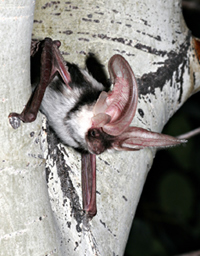
Interactions
The Brazilian/Mexican Free-tailed Bat has a diet much like any other bat you would find. Like many other bats they eat moths, beetles, wasps, and bees. Basically if it is an insect, preferably one that can fly, they will eat it (Sosnicki, 2012). These free tailed bats do have limiting factors though just as any other organism. The weather is a big factor, the amount of food available and also the amount of light from the moon, due to the fact they generally feed at night (Sosnicki, 2012). They tend to eat while they fly, which is why they mostly eat insects that fly. Another source of food for these bats are Lepidoptera and Noctuidae moths. These serve two purposes, one it provides the bat with nutrients to survive and also helps keep down the population of the moths, which are pests to agricultural products in parts of Mexico (Russel et al., 2011).

It is especially helpful that
they eat insects in the summer months when
insects are thriving and
crops are trying to grow. As for the bats interactions with other
animals and humans, they have both a positive and negative
relationship. With humans it can go both ways, humans are afraid of
bats, but with little reason. Bats are truly helpful to humans, they
eat insects, they do not bother humans, and very rarely do we see
them any lower than the doorways of buildings (Davis et al., 1962).
Not only do the bats eat the insects but they also provide
fertilizer from the guano they make. In the caves that these bats
live in it is not uncommon to find other species of bats living
together.
During the summer months
ammonia levels in some caves are so high that it is almost deadly to
humans and other animals. This is beneficial to the bats because
they can still live here and lover the risk of predation (Davis et
al.,1962). Brazilian/Mexican Free-tailed Bats have to be most
worried about predation from larger birds such as Great Horned Owls,
and different types of hawks. Although since the bats have such a
large population, the killing of just a few hardly makes a dent at
all. Once problem Brazilian/Mexican Free-tailed Bats have is they
can get rabies, which can be more detrimental to other species
rather than themselves(Sosnicki, 2012).
Continue to references
Return to Home